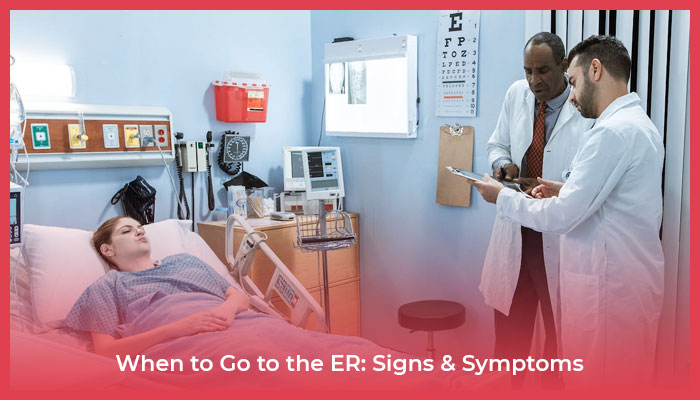Recognizing when to go to the ER can be a matter of life and death.Understanding the signs and symptoms that warrant a trip to the ER is essential for everyone’s well-being. In this comprehensive guide, we’ll explore various medical conditions and the warning signs that indicate it’s time to go to the ER.
When Chest Pain Strikes
Unrelenting Chest Pain
Sudden, severe, and unrelenting chest pain can be a sign of a heart attack. Understanding when to go to the ER is crucial to seek immediate medical attention in this situation.
Radiating Pain
Chest pain that radiates to the arm, jaw, or back is a serious concern and should never be ignored.
Shortness of Breath
Chest pain coupled with difficulty breathing is another sign of a potential cardiac emergency.
Breathing Troubles
Severe Shortness of Breath
If you’re struggling to breathe, gasping for air, or experiencing wheezing, it could be due to various issues, such as asthma, allergies, or even a pulmonary embolism.
Blue Lips or Fingernails
When your lips or fingernails turn blue, it indicates a severe lack of oxygen in your blood, which requires immediate medical evaluation.
Neurological Symptoms
Sudden Weakness or Numbness
Sudden weakness or numbness on one side of the body can be a sign of a stroke. Time is of the essence in stroke cases.
Seizures
Uncontrolled seizures or those lasting more than five minutes require immediate ER care. Knowing when to go to the ER can save lives.
Severe Headache
A severe, sudden-onset headache, often described as the “worst headache of my life,” can signal a brain hemorrhage.
Abdominal Distress
Severe Abdominal Pain
Intense abdominal pain that doesn’t subside may be due to conditions like appendicitis, pancreatitis, or a bowel obstruction—knowing when to go to the ER is vital.
Blood in Vomit or Stool
The presence of blood in vomit or stool could indicate a severe gastrointestinal issue, which necessitates immediate medical assessment.
Injuries and Fractures
Compound Fractures
Compound fractures, where the bone breaks through the skin, require urgent medical attention to prevent infection.This is a clear sign of when to go to the ER.
Severe Burns
Burns that are deep, extensive, or located on the face, hands, feet, genitals, or major joints should be treated in the ER.
Conclusion
Knowing when to go to the ER can be a matter of life or death. Recognizing the signs and symptoms that indicate a medical emergency is crucial for your health and the well-being of your loved ones. When in doubt, it’s always better to seek prompt medical attention to ensure the best possible outcome.
FAQs
Q: Can I drive myself to the ER if I’m experiencing severe symptoms?
A: It’s safer to call 911 or have someone drive you to the ER to ensure prompt care.
Q: What if my symptoms aren’t on this list, but I’m still concerned?
A: When in doubt, it’s always better to seek medical care. ER staff can assess your condition and provide guidance.
Q: How long can I wait before seeking help for chest pain?
A: Don’t wait—seek help immediately if you experience chest pain.
Q: Are ERs equipped to treat all medical conditions?
A: ERs can stabilize and assess a wide range of medical issues. They may refer you to a specialist if needed.
Q: Can I go to the ER for mental health emergencies?
A: Yes, the ER is the right place to seek immediate help during a mental health crisis. Knowing when to go to the ER ensures timely care and support.
Q: Do I need insurance to visit the ER?
A: No, you don’t need insurance to receive emergency medical care. ERs are legally required to treat all patients, regardless of insurance status.
